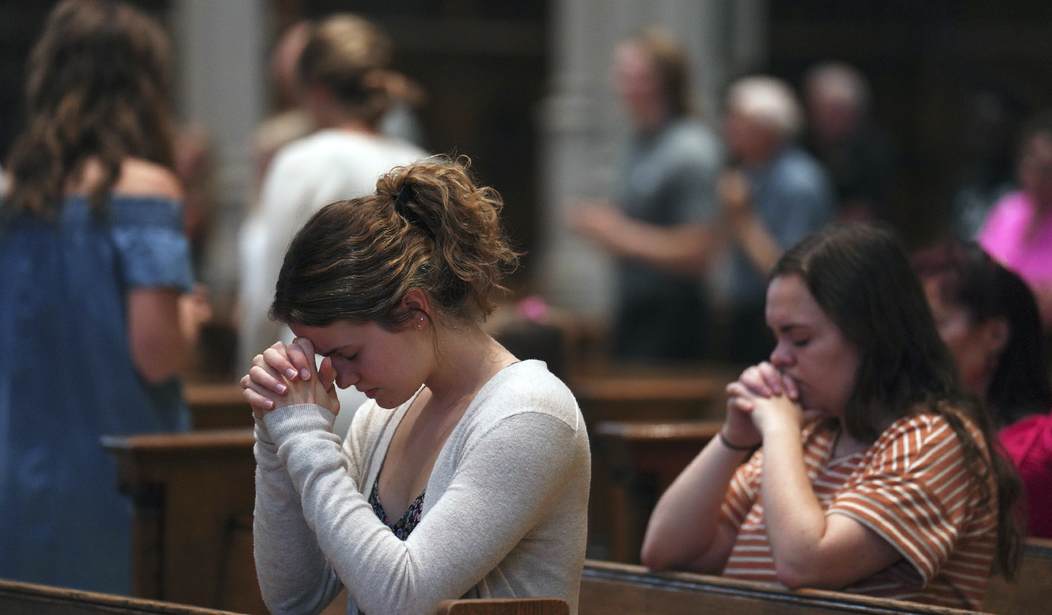America seems to have a love/hate relationship with prayer. Sometimes we love it. Prayer was called for in Baltimore this week after a cargo ship collided with a support column of the Francis Scott Key Bridge, collapsing most of the span in the early morning hours of March 26.
Maryland Governor Wes Moore expressed appreciation for the rescue crews and the need to “pray for everyone’s safety.” Baltimore Mayor Brandon Scott, standing before the TV cameras, said shortly after the disaster, “We have to first and foremost pray for all of those who are impacted, those families, pray for our first responders and thank them.” Baltimore County Executive Johnny Olzewski echoed Scott, urging people on X to “Please pray for those impacted.”
Each of these elected officials, in the course of conducting their official duties, encouraged the people of Baltimore - indeed, the nation, to pray. Agents of the government publicly called on citizens of all ages to engage in a religious act. These calls to prayer were punctuated later that evening with a prayer vigil, “coordinated in conjunction with Mayor Brandon Scott and Baltimore County Executive Johnny Olszewski.”
At the other end of the prayer spectrum is Cardiff Middle School in Katy, Texas, 30 miles west of Houston. The principal is alleged to have pressured and intimidated one of his school’s teachers in an attempt to prohibit the free exercise of religion through prayer. It appears prayer in the absence of a catastrophic bridge collapse is less loved.
Recommended
A lawsuit filed by the American Center for Law and Justice names Principal Bryan Scott Rounds and the Katy Independent School District as defendants, and alleges that Rounds sought to prohibit math teacher Staci Barber from engaging in prayer at the foot of the school’s flagpole before class. Barber’s prayer did not interfere with her teaching duties, yet she was told not to pray because “Even though it is before the school day, you are on campus visible to students in your role as an employee.” Evidently, it’s OK to pray so long as it’s hidden in the shadows, like 2nd century Christians in Rome.
As for the Katy School Board, they drape themselves in the threadbare cloak of an amateurish misreading of the Constitution. “The District is committed to the constitutional principle of separation of church and state,” reads the school district’s policy on religious activity. It continues saying, “Board Policy makes it clear that employees will neither advance nor inhibit religion,” seemingly oblivious to the contradiction of prohibiting a teacher from praying on her own time in the name of not inhibiting religion.
This double standard on prayer is vexing. On one hand, it’s fine for high-ranking politicians to encourage their constituents to pray during times of tragic disasters. We’ve actually come to expect it from our elected leaders. But this idea gets inverted to an actionable offense when a teacher wishes to engage in ordinary prayer on an ordinary day.
Some people, perhaps including Principal Rounds and others affiliated with the Katy School District, might believe that prayer is not to be tolerated in school, citing the U.S. Supreme Court’s 1962 decision regarding school prayer. But through ignorance, malice, or something else, the same parties seem unaware of the 2022 Supreme Court decision in Kennedy v. Bremerton School District.
In Kennedy, the court handed down a 6-3 decision saying that Bremerton, Washington, high school football coach Joe Kennedy has a constitutional right to kneel and pray on the 50-yard line after football games. He lost his job for praying in public but eventually prevailed in his case, reaffirming that prayer by school employees should not be relegated to some form of second-class speech. Just as a high school coach has the right to pray at midfield after a football game, so should Staci Barber be free to pray at her school’s flagpole before class.
Of course we should pray during difficult times, as Governor Moore, Mayor Scott and County Executive Olszewski have so earnestly advocated. It may gratify them to know that millions of Christians send up prayers every day, and many of them are for the people of Baltimore. But not all trials and tribulations are as public as the collapse of a 1.6 mile-long bridge along an interstate highway.
Many prayers are in response to personally tragic disasters and private difficulties. Others are simply prayers of thanks to God for a sunny day or good health. In any event, Christians should not be preyed upon for the sin of not having their prayers joined by powerful politicians. Doing so is nothing short of authoritarianism by which government functionaries determine which prayers are OK and which are not. All Americans should be glad that Staci Barber is standing up to this intolerance, and I join in her lawsuit’s Prayer For Relief.

























Join the conversation as a VIP Member